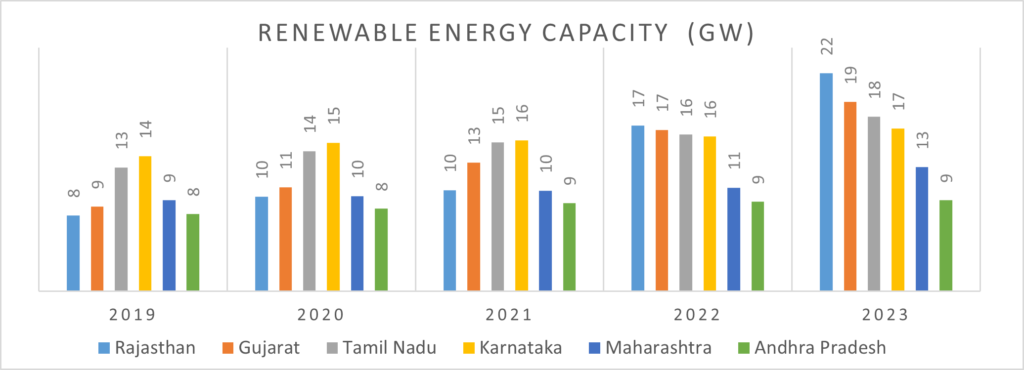Is Rajasthan the Future of Renewable Energy in India?
Rajasthan, a state renowned for its large open spaces and plenty of sunshine is leading the way in India’s adoption of solar energy. The Rajasthan government has set lofty goals to attain a net-zero carbon emissions future and has made notable progress in promoting renewable energy. The goal of the Indian government is for the country to become a leader in the clean energy transition by 2030, with 450 GW of renewable energy capacity. This plan heavily emphasizes solar energy, mainly growing rooftop installations and grid-connected solar power projects. In this article, we will explore the importance of Renewable energy in the Indian context and the contribution of Rajasthan towards renewable energy in India.
Importance of Renewable Energy in India
India, the country with the largest population in the world, needs to meet all of its energy needs in order to improve living conditions for its citizens. Coal and other fossil fuels, such as crude oil, provide 54% of India’s energy. These energy sources will, nevertheless, eventually run out. Making full use of the potential of renewable energy sources is one way to avoid depending entirely on conventional energy sources. India’s population is widely dispersed over a large geographic area, making it difficult for the government to supply all citizens with electricity through the centralized national grid. Renewable energy is a good option as it can be used as a stand-alone distributed generation system.
Rajasthan: A Leader in Renewable Energy
Rajasthan is leading India’s transition to renewable energy, as demonstrated by the 37 GW installed capacity powered by renewables to the tune of more than 60%. The state leads India in installed solar generation capacity (17 GW) and is in the top five for installed wind generation capacity. Situated in Bhadla, Jodhpur, the state is home to one of the largest solar parks globally, spanning 5783 hectares and boasting a 2245 MW capacity.
Competitive advantage: Solar Potential of the Thar Desert
Rajasthan is not only the largest state in India but also has the most rugged and unproductive terrain in the country due to the presence of the Thar Desert. With an average daily solar insolation of between 5.5 and 6 kWh/m², the Thar Desert has some of the highest solar radiation levels in the world. This is a great place to generate solar energy because it is much higher than the global average. The solar insolation of the Thar Desert is impressive statistically. On average, the area experiences over 300 sunny days annually, with mostly clear skies. Large-scale solar power plants benefit significantly from the vast, sparsely populated land and constant exposure to sunlight. The Sahara Desert and some of the sunniest areas of the United States, like Arizona and Nevada, have solar radiation intensities similar to those of the Thar.
Growth of renewable energy in Rajasthan
Rajasthan is witnessing huge capacity addition and investment proposals in the renewable space.
Apart from Bhadla solar park, 925 MW capacity park has been developed in Nok, Jaisalmer and 750 MW capacity park in Phalodi Pokaran. Besides, 3150 MW power plants are being installed in Barmer, 2100 MW in Bikaner and 2000 MW in Jalore. And not only this, Coal India Limited and Rajasthan Vidyut Utpadan Nigam i.e. RVUN have invested Rs 5400 crore to build 1190 MW park in Pugal block of Bikaner district,
More than Rs 3.05 lakh crore renewable energy sector agreements have been signed for green energy in the 2022 Invest Rajasthan summit.
Renewable Energy Capacity (GW)
| States | 2019 | 2020 | 2021 | 2022 | 2023 |
| Rajasthan | 8 | 10 | 10 | 17 | 22 |
| Gujarat | 9 | 11 | 13 | 17 | 19 |
| Tamil Nadu | 13 | 14 | 15 | 16 | 18 |
| Karnataka | 14 | 15 | 16 | 16 | 17 |
| Maharashtra | 9 | 10 | 10 | 11 | 13 |
| Andhra Pradesh | 8 | 8 | 9 | 9 | 9 |

Rajasthan became the first state in India to install more than 20 GW of renewable energy cumulatively in 2023. With a total installed capacity of 22 GW, Rajasthan is currently the largest state in India for renewable energy. The state has made impressive strides in installing renewable energy capacity, moving up from fourth place in FY2019 to first place in FY2023.
Government Support
Rajasthan’s transformation into the country’s renewable powerhouse is well supported by Central Government’s PM Kusum Yojana, which pays farmers between Rs 12000 and Rs 15000 per bigha per year for 25 years, with 5% annual increases, from any company that wants to install solar infrastructure on their unused land. Large tracts of land in Rajasthan cannot be farmed, so as part of the plan, farmers are willing to donate their land to the Solar Infrastructure Company. Furthermore, the Rajasthan government provides subsidies to renewable energy projects, reducing the cost of setting up solar parks for big companies and thus increasing the demand for renewable energy
Future Plans
The government of Rajasthan has established even more audacious goals for the future. It hopes to reach 100 GW of solar power capacity by 2030. To diversify its energy mix, the state is also looking into other renewable energy sources like hydropower and wind. Rajasthan has a great chance to lead India in renewable energy with the support of the government and the state’s advantageous environment.
In conclusion, Rajasthan is a leader in India’s renewable energy market thanks to its enormous solar potential, strong government backing, and effective execution of large-scale solar projects. Rajasthan is well-positioned to be a key player in helping the nation achieve its environmental goals as it transitions to a greener future.
Sources:
- Central Electrical Authority, ministry of Power
- Renewable Energy Sources In Rajasthan For Sustainable Development
- Ministry of New and Renewable Energy
- Solar Power Oasis Harnessing the Green Energy Potential of the Thar Desert



0 Comments